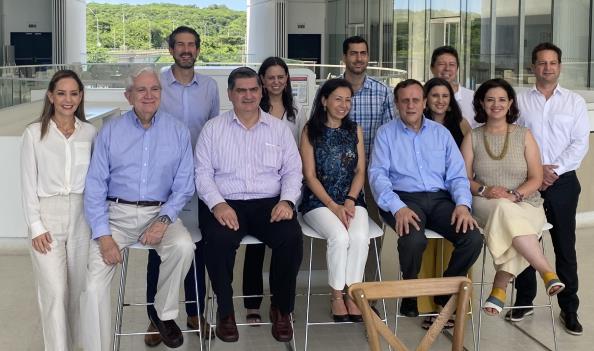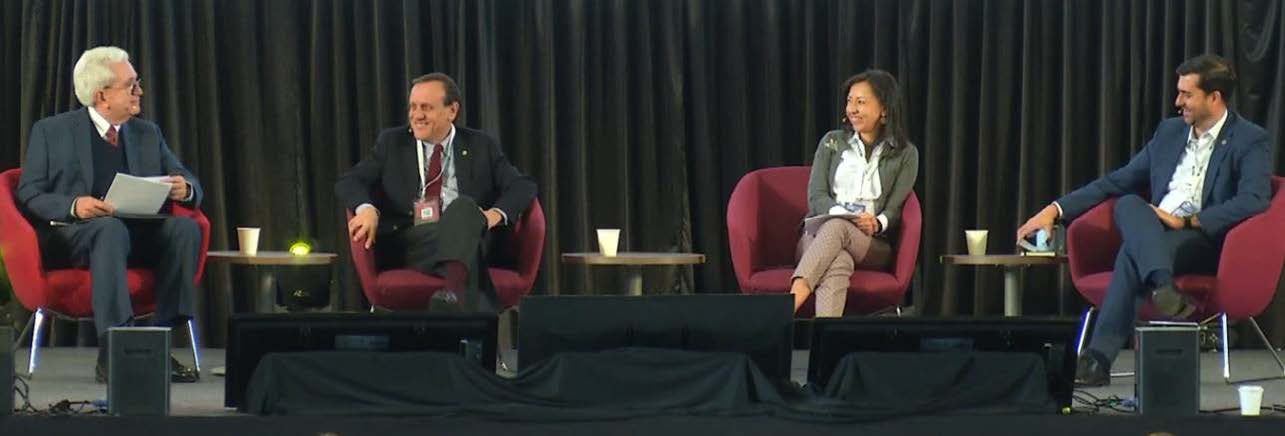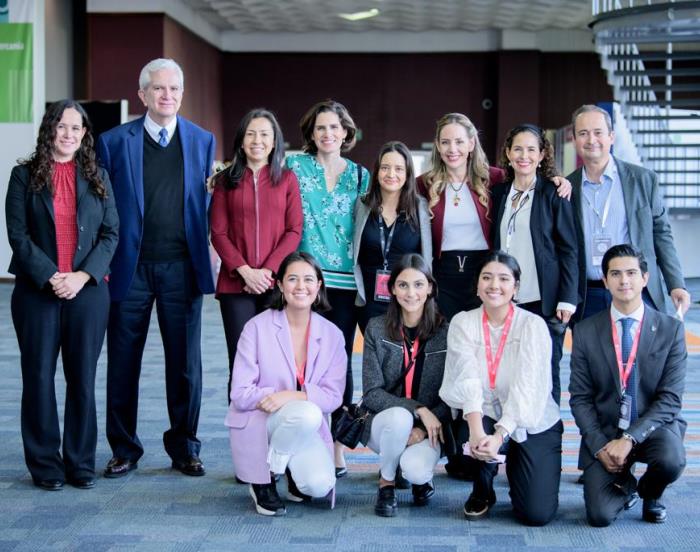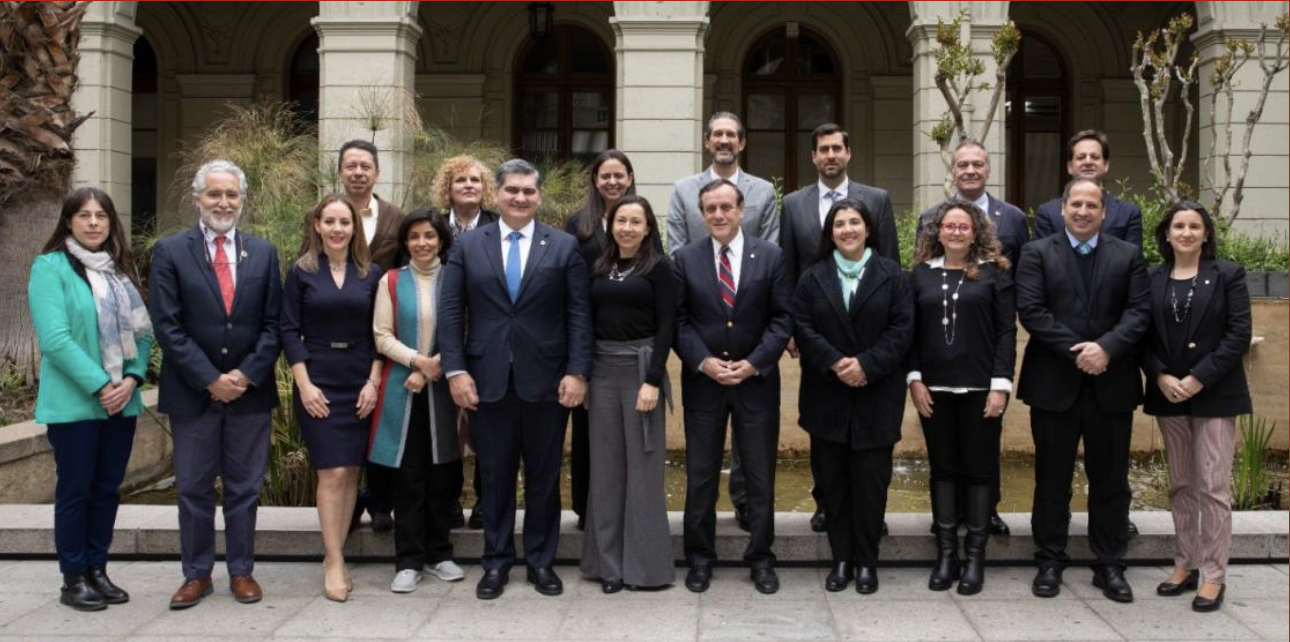Dr. Ricardo Lagos — former President of Chile and a distinguished scholar — recently underscored that Latin America lives a new period of deep crisis, isolated not only from the rest of the world but within itself… I can´t recall a juncture worse than this…”
Luis Alberto Moreno — former President of the Inter-American Development Bank — adds: Unless we achieve urgent, fundamental reforms, we will be trapped, as in the past, in a “spiral of unrest, political dysfunction and economic angst…”

La Tríada was launched against this backdrop in August of 2018. It was conceived as a platform to build on the shared aims and proficiencies and the potential synergies offered by the three best private universities in Latin America according to international rankings: Universidad Católica de Chile, Universidad de los Andes from Colombia, and Tecnológico de Monterrey from Mexico. It has turned out to be much more.
La Tríada has built on longstanding bilateral links between our universities and it has rendered unprecedented — and unexpected — levels of productive cooperation. Its website displays the array of academic and research projects completed or under development: 14 impact areas with over 80 initiatives, from innovation in education to applied ethics; from health to sustainability; from electromobility to early childhood. All this materializes in joint research and academic programs, courses offered in tandem, seminars, exchanges, etc., with broad and growing participation from these three world-class institutions.

This alliance is ultimately focused on helping provide awareness and urgent, effective solutions to the dire levels of inequality, poverty and even incipient signs of anomie prevalent throughout Latin America. It strives for a coherent set of initiatives that have an impact beyond our most immediate mission: inclusive education of the best quality. It is contributing to a common narrative on our region´s key challenges and the best ways to face them. Along the way, it adds perspective on best practices and the role universities should play in this juncture.
The context is of great concern. Poverty is persistently high, paired with unparalleled levels of violence and insecurity. Social mobility is marginal. Fiscal resources are increasingly in short supply, poorly collected and accounted for, and unproductively applied. And as ECLAC reports, Latin America is today the most unequal and less inclusive region in the world. The gaps between rich and poor are appalling and unsustainable. Diverse and very visible forms of discrimination add to the sources of social grievance, resentment and polarization.
This is not only leading to pervasive cases of social unrest, but to a profound discontent with politics and substantial intolerance to non-authoritarian modes of governance. Electoral extremes gain credence and the “center cannot hold”, to quote Yeats. The strain on our social fabric and cohesion is more and more evident. We have lived many instances of civic turmoil in the past; what is new is the speed of contagion and upsurge of dissent, the way that real and perceived affronts and outrage spread and grow.

Three decades worth of a liberal democratic penchant, with a parallel preference for market-based economics, seems to be in a predicament today in Latin America. Appetite for furthering democracy has waned. Latinobarómetro reports a clear tendency toward a “democratic recession” as they rather euphemistically call it. Political institutions, structures and agents are discredited; electoral processes take place amidst disinformation and the intemperance of social networks.
Disillusionment, skepticism and anxiety among our youth — which we monitor poorly — are particularly salient and daunting. The level of frailty has been exacerbated by the pandemic. To complicate things, a huge proportion of our younger generations have no direct memory or even awareness of previous stages of populist and totalitarian folly across the political spectrum in our region as a point of reference.
There is an additional factor that tends to be neglected. It has to do with the lack of a sense of urgency in our countries — the “mañana syndrome”. The region is aging more rapidly than any other globally. The median age has gone from 17 years half a century ago to 30 today, trending toward 45 in 50 years. The ratio of the elderly to the young has gone from less than 9% 50 years ago to 37% today, and is projected to reach 180% in 50 years. Postponing urgent reforms is not an option.
The balance of much lower rates of population growth and rapid changes in the age structure are starting to have an alarming impact on the region that goes rather unnoticed. The demographic bonus — prevalent since the 1960s, when dependency ratios decreased and development efforts could have been easier, “growing rich before growing old” — will dry up before this decade is over. In the meantime, we seem to be in no hurry. As Dr. Lagos puts it plainly: we are facing a “catastrophic accumulation of quiescence, of no-change…”
“No-change” is worse than it sounds; it is the pathway not to stagnation, but to receding, to a spiraling decline vis-à-vis others. Case in point, simply as one of many examples: according to the World Intellectual Property Organization, the Republic of Korea´s patent filings in 2021 were 95 times the total filed in our three countries, despite their population being three times smaller than our total. Their investment in R&D to GDP ratio is 16 times ours.
The contrasts in education systems and performance are shocking, as reported by the OECD and other sources. Our region is particularly incompetent at retooling our workforce, at reskilling to the needs and opportunities provided by the realignment of global production and supply chains that holds great promise for many of us through nearshoring. The “quiet catastrophe” that was diagnosed 30 years ago at all education levels is now quite strident, eroding our current and potential prosperity.
It is not by chance that over the past four decades South Korea has gone from close to one third of our GDP per capita to almost three times in purchasing power parity terms. How do we revert these trends and huge gaps in a world that is making exponential strides in technology, where lagging behind ensures persistent and growing economic and social setbacks?
There is no place for subtleties and nuance here, for flimsy exuberance; no place for more quiescence, for more “no-change”. This is the time to find impelling, catalytic sources of optimism, to formulate doable all-embracing roadmaps, dreams even, viable utopias — not regressive ones, to quote Fernando Henrique Cardoso. Academic alliances should be the cornerstone of these designs and endeavors, the crucial fora to debate, persuade, convene and coalesce around national and regional blueprints for a better future. They should be the seedbed of a new aptitude and mindset, a new predisposition for the constructive change we need.
Universities are not only the epicenter for exploring problems and developing technical and scientific solutions. They should be the meeting ground where we learn to live and deliberate collectively; to build agreements and basic, essential levels of consensus; where values and a civic conscience and commitment are groomed, discussed, validated and nurtured.

We are less than three years away from the bicentennial of the “Congreso Anfictiónico” in Panama, the failed attempt by Simón Bolívar to create a parliamentary and military union among the new independent nations of Latin America. For two centuries, there have been countless integration and cooperation initiatives and agreements, to very little avail. Abundant rhetoric, few results. As an eloquent example, according to UNCTAD, intraregional trade among our countries is less than 15% of our total foreign trade; in the European Union it is close to 70%.
We remain indeed “isolated among ourselves…”, let alone increasingly irrelevant in the broader geopolitical sphere. More so as the world reckons with vast centrifugal forces, far from the times when we indulged in the post-Cold-War, end-of-history, the-world-is-flat euphoria.
This is the time in Latin America for profound introspection. The time to try new pragmatic, less pretentious formulas to come together; to share and debate ideas constructively; to think and work collectively regarding our many assets, considerable prospects, and profound roadblocks — so many of them self-imposed in a land so prone to “autogoles”.
La Tríada is one of the many spaces we need for soul-searching. It has proven itself, representing five years of collective opportunities that have jelled admirably, with an even greater potential ahead. The alliance would have been impossible in the absence of a central ingredient, unusual in the broader international academic realm: the extraordinary institutional empathy that has emerged at all levels between these three preeminent universities. This is a priceless asset, enabling a model growing in impact and recognition. In view of the persistent lags, the deep challenges and the aloofness the region faces, this is no small thing…
